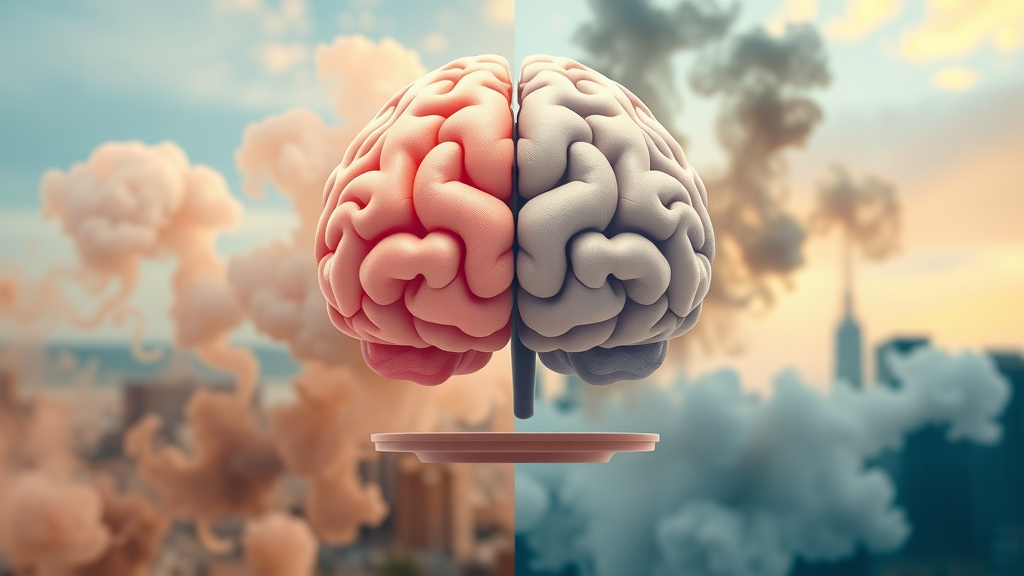"Studies indicate that just a few minutes of mindfulness each day can reduce stress by 30%."

Understanding Mindfull: The Path to a More Centered Life
Have you ever paused to wonder if you're truly mindful, or if your mind is full? The subtle difference between “mindfull” and “mindful” can dramatically alter one's quality of life. This journey to becoming "mindfull" involves cultivating small, yet significant habits that lead to a more centered existence.
In this guide, we delve into both concepts, helping de-mystify their meanings and applications. So whether it's practicing mindfulness meditation, becoming a good listener, or utilizing meditation scripts to achieve daily calm, there's something invaluable you can adopt today.
Is it Mindfull or Mindful?
- Explore the etymology and different uses of 'mindfull' and 'mindful.'

The debate over "mindfull" and "mindful" often perplexes even the most seasoned mindfulness practitioners. To clarify, “mindful” refers to being present, aware, and fully engaged in the current moment. On the other hand, "mindfull" is a playful twist indicating a state where one's mind might be overflowing with thoughts, often leading to stress instead of serenity.
Understanding this distinction is crucial as both terms may surface differently in mental health realms, influencing how we approach mindfulness exercises and how we perceive our cognitive function.
What is Being Mindful?
- Delve into the concept of mindfulness and its daily applications.
Being mindful involves paying attention in a particular way: on purpose, in the present moment, and non-judgmentally. This form of awareness often separates us from the heightened speed of modern life. By investing time in mindfulness practice, we can profoundly enhance our relationship with food, other people, and even ourselves, thus improving our overall quality of life.
Mindfulness meditation works as a foundational practice, helping you embrace life’s flow without being overwhelmed by burdensome thoughts or stress. It allows one to observe and recognize emotions and thoughts without getting entangled.
Mindfull versus Mind Full: Clarifying the Difference
- Discuss how being 'mindfull' can differ from having a 'mind full'.
It's vital to distinguish between being mindfull and having a mind full. When you're mindfull, you practice mindfulness cessation, pacing life in more tangible, digestible portions. However, when your mind is full, thoughts become erratic, leading to scattered energy and focus.
Out of necessity, cultivating mindfulness can combat common mental health issues, including fatigue, by developing a meditative and nurturing routine. For this reason, many clients find refuge in practices such as guided meditation, reminding us to value the present moment over the clutter of a vast mind.
Are You Mind Full or Mindful?
- Guide readers on self-reflection to assess their own mindfulness status.
To evaluate whether you are being mindful or if your mind is, in fact, full, ask yourself: Are you present or preoccupied with past or future problems? Take a moment to reflect on the day’s tasks—do they feel like a chore or a chance for meaning and growth?
Active engagement in mindfulness exercises through meditation practices is a practical way to gauge your level of awareness. From here, you can discern areas where a shift may be necessary, possibly adopting new practices for stress reduction. Self-assessment is not an endpoint but a continuous process of growth and sentinel adjustment.
Mindfull Habits for Everyday Life

Mindfulness Meditation: A Simple Habit to Start
- Steps to incorporate meditation into your daily routine.
Establishing a routine with mindfulness meditation doesn’t require a significant amount of time, nor does it demand a specialized background in nutritional science or medical expertise. In fact, simplicity is key, offering easy integration into one's lifestyle.
Begin by setting aside just five minutes a day to sit quietly, focusing on your breath. As your comfort grows, gradually extend this time. Such practice not only promotes mental health but also reduces stress levels, offering mental clarity and resilience against daily challenges.
Being a Good Listener: Its Impact on Mental Health
- Describe how active listening improves relationships and mental well-being.
Active listening is an integral aspect of being mindfull. It’s about diving deep into conversations with attention and empathy. This shift in interaction reduces stress and helps build stronger, more meaningful relationships.
By genuinely listening, you not only enhance personal connections but also create a sense of grounding for yourself. This, in turn, serves as a critical component of good mental health, cultivating an environment where love and compassion flourish.
Guided Meditation for Beginners
- Suggestions and resources for starting guided meditation practices.
For beginners, guided meditation offers an invaluable pathway to mindfulness. These resources simplify the practice, leading you through the process without grappling with uncertainties or distractions. Options are available through numerous platforms, accommodating various needs, from more introspective meditations to those aimed at stress reduction.
Each guided session builds upon the ability to focus the mind, gradually introducing methods for serene reflection. As a direct result, participants report improvements in cognitive function and overall well-being.
Using Meditation Scripts to Achieve Calm
- Provide examples and benefits of using meditation scripts.
Adopting meditation scripts can transform your mindfulness routine. These scripts serve as a journey guide, providing precise visualizations or affirmations that reinforce mindfulness practice. By focusing on pre-written narratives, individuals can channel their thoughts more efficiently, achieving a deeper state of calm.
Scripts can vary in focus, from breathing exercises to visualizations, allowing mindfulness to permeate different life areas. Their versatility reflects in how users can integrate them into morning routines or moments of stress, highlighting a personalized approach to finding peace.
Maximizing Mental Health Through Mindfull Practices
Mindfulness Practice: Incorporating into Your Routine
- Tips for making mindfulness a regular part of your life.
Consistency is crucial when embracing mindfulness practices to better mental health. Incorporate regular times for mindfulness meditation, as well as small moments of reflection, such as while journaling or during meal times to enhance the mindfulness experience.
Adopt simple strategies like breathing techniques or mindfulness worksheets as resources to maintain engagement and reform habits. This consistent effort supports a structured approach, ensuring that mindfull practices are not only initiated but sustained.
"The way to health is to focus on the mind as well as the body."

- Top 5 Benefits of a Mindfull Approach
- Enhanced cognitive function and reduced stress.
- Improved relationships and active listening skills.
- Increased presence and awareness of the present moment.
- Better emotional regulation leading to greater quality of life.
- Overall mental health improvements.
Challenges and Tips for Maintaining a Mindfull Lifestyle
- Common obstacles and solutions in developing mindfull habits.
Transitioning to a more mindfull lifestyle presents its challenges, including ingrained habits of distraction and past experiences that preclude presence. However, confronting these obstacles with determination and tools, such as guided meditation and community support, provides an actionable pathway toward transformation.
Additionally, set realistic goals for daily practices, and remind yourself that mindfulness is a journey, not a destination. This proactive stance fosters a sustainable approach in overcoming challenges and keeping progress in perspective.
People Also Ask
Is it mindfull or mindful?
- Answer explaining the spelling and usage distinctions.
The term mindful generally refers to being fully present and aware in the moment, characterized by mindfulness practice and mental health improvement activities. Conversely, mindfull is a creative twist denoting the opposite—having a 'mind full' of thoughts causing potential disruption to one’s cognitive function and stress levels.
What is being mindful?
- Explanation of mindfulness as awareness and presence.
In essence, being mindful focuses on awareness and harnessing presence. It entails engaging with the present moment, with a conscious detachment from judgement and stress preoccupation. This lets individuals experience more tranquility, decrease nervous system overload, and foster emotional regulation.
What is the difference between mindful and mind full?
- Comparison pointing out the critical differences.
Mindfulness champions intentional awareness and reflects in mindful exercises that support mental health. In contrast, being 'mind full' fills your mind with unchecked clutter, reducing stress resilience and inducing anxiety. Emphasizing the practical benefits of mindfulness underscores its importance in daily wellness routines.
Are you mind full or mindful?
- Encouragement for readers to self-assess.
Regularly engage in self-assessment to discern if you're residing in a mindful state or dealing with a mind full mindset. Consider tools like mindfulness worksheets or guided meditation to facilitate this process, ensuring any shifts towards presence enhance your personal and mental health.
FAQs on Being Mindfull
- Address frequently asked questions around 'mindfull' practices.
Questions naturally arise around the 'mindfull' practice journey. Exploring the uses of meditation scripts, evaluating nutritional science insights, and being a good listener all play a role in questions about how to begin or deepen mindfull habits.
Discover How Mindfull Can Transform Your Life
Embracing a mindfull way of life starts with introducing small, manageable habits. From taking a few moments for meditation practice to being actively present, each step draws you closer to a life free from stress and full of mindfulness. Explore guided resources to deepen your practices, ensuring your journey is ongoing and enriched by each new experience.
Learn more about our guided resources to deepen your mindfull practices.
 Add Row
Add Row  Add Element
Add Element 



Write A Comment